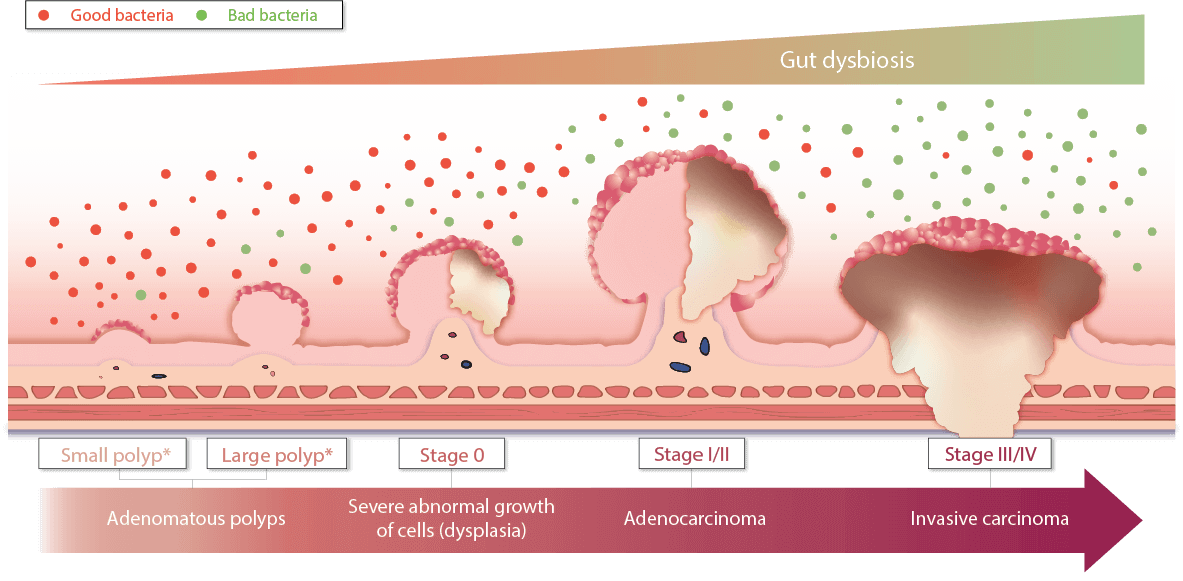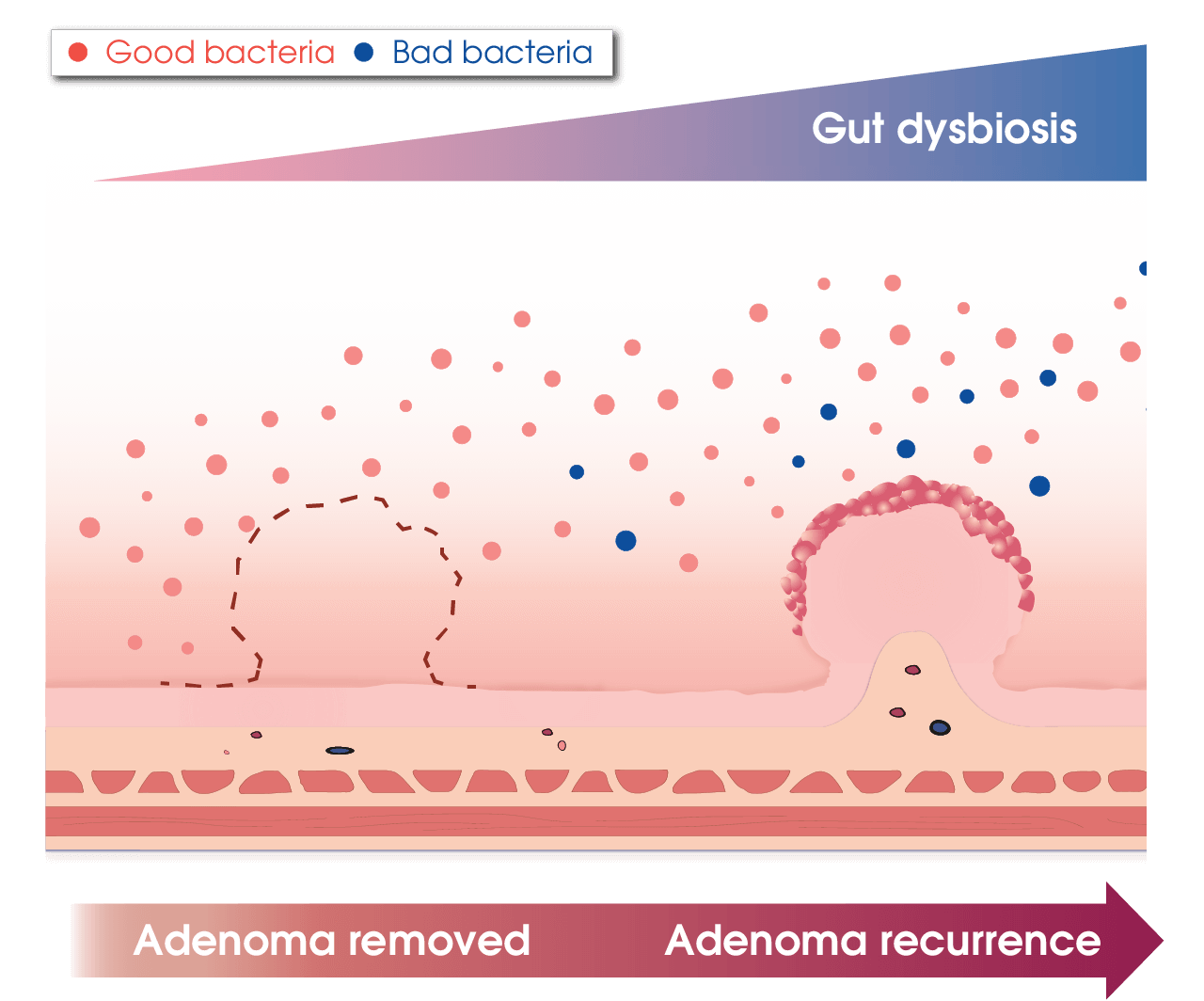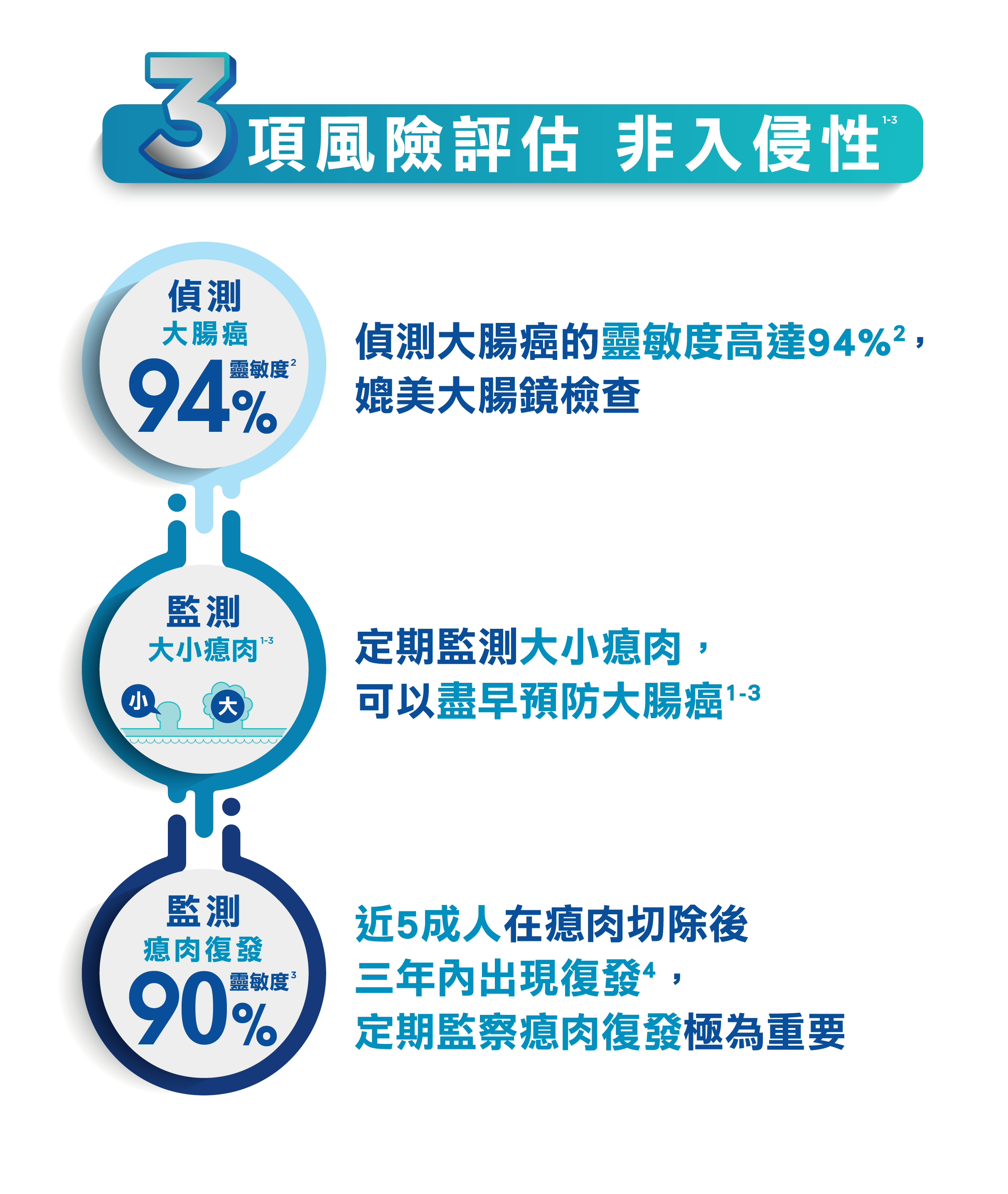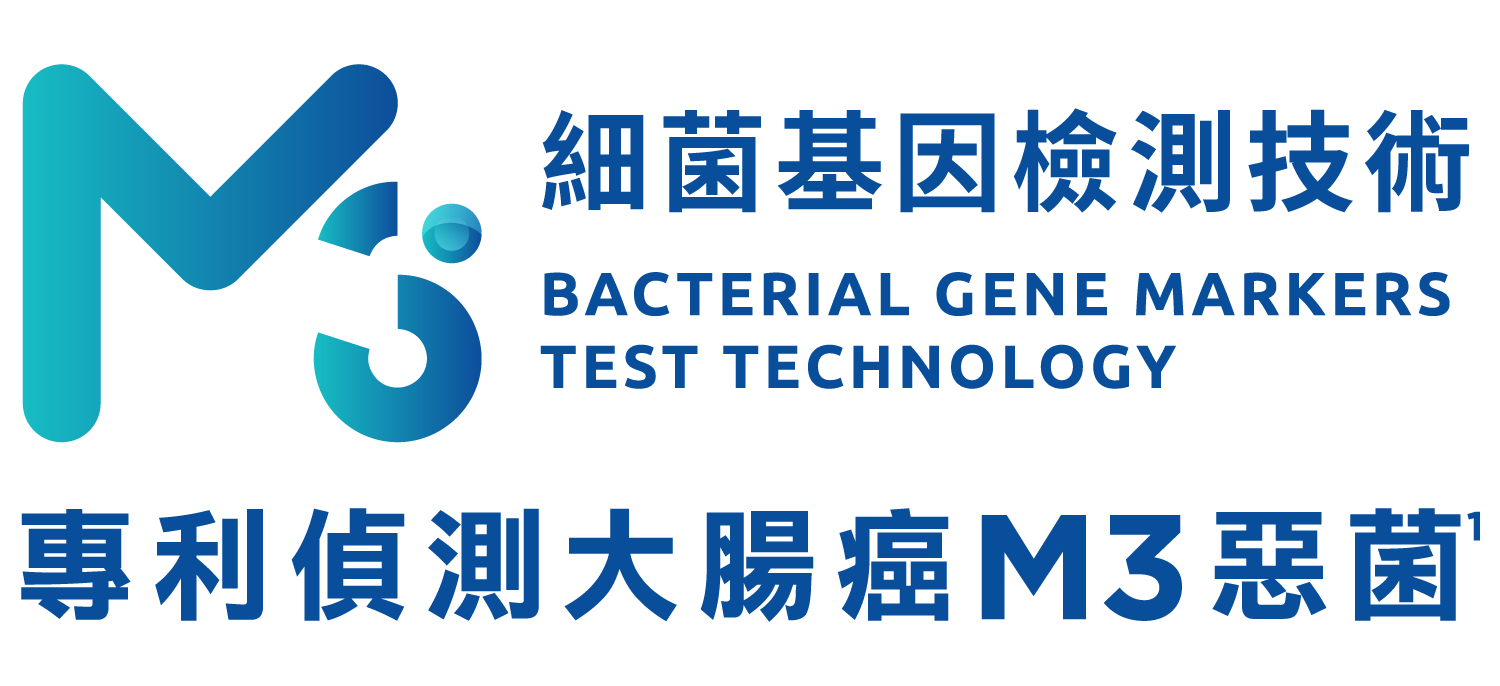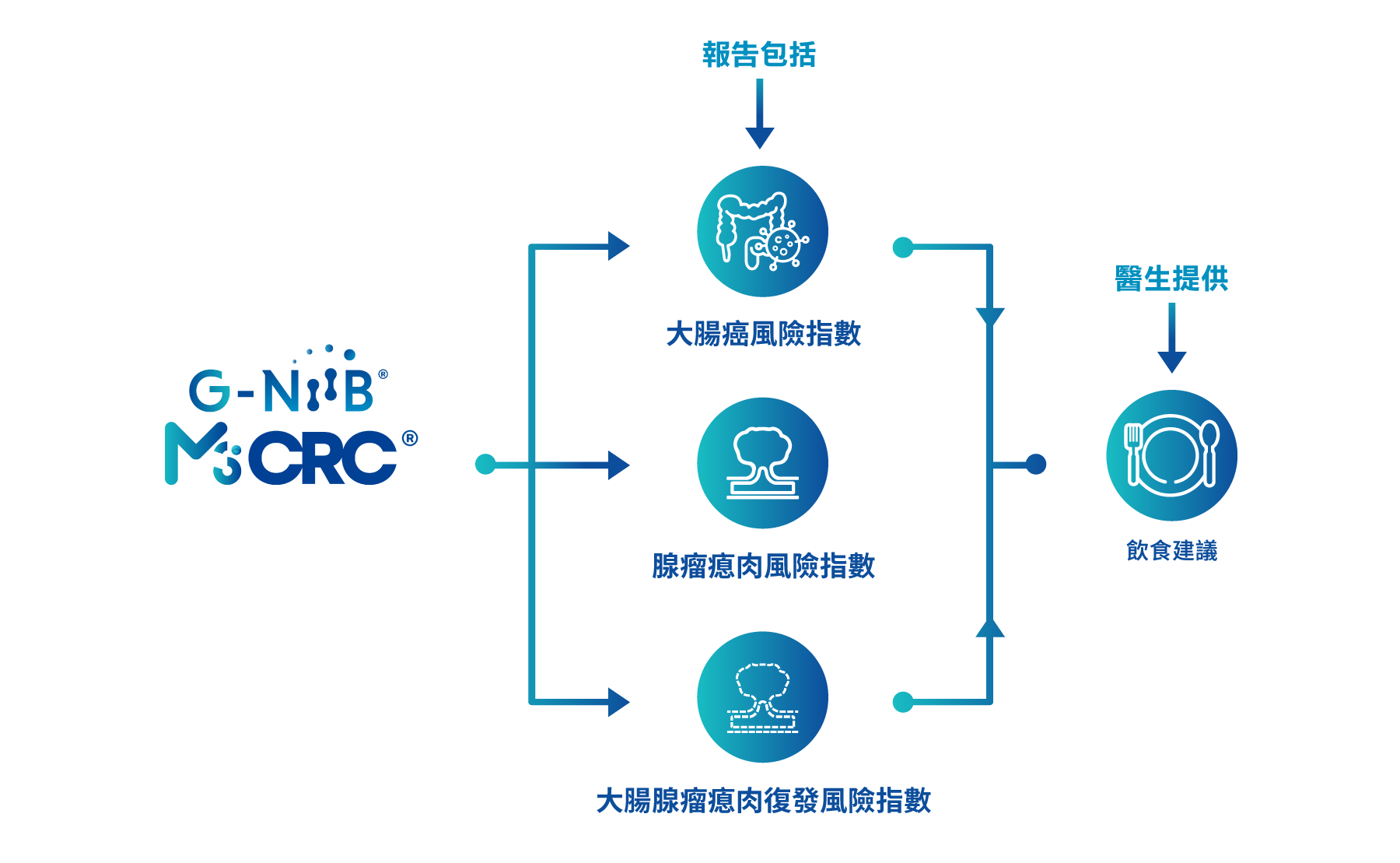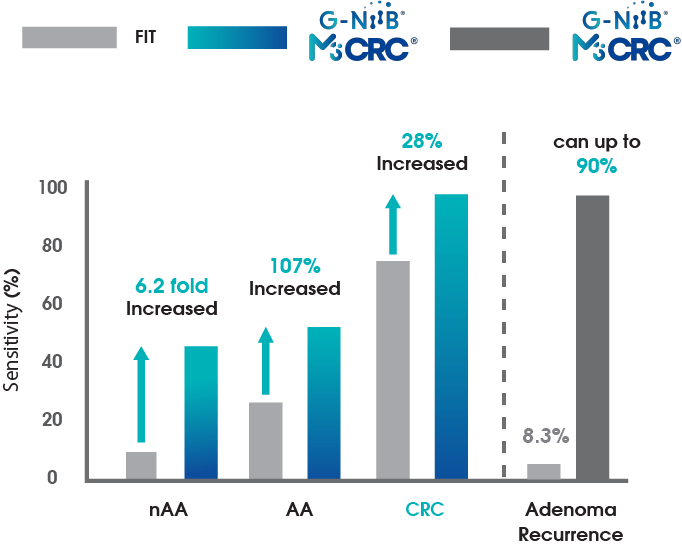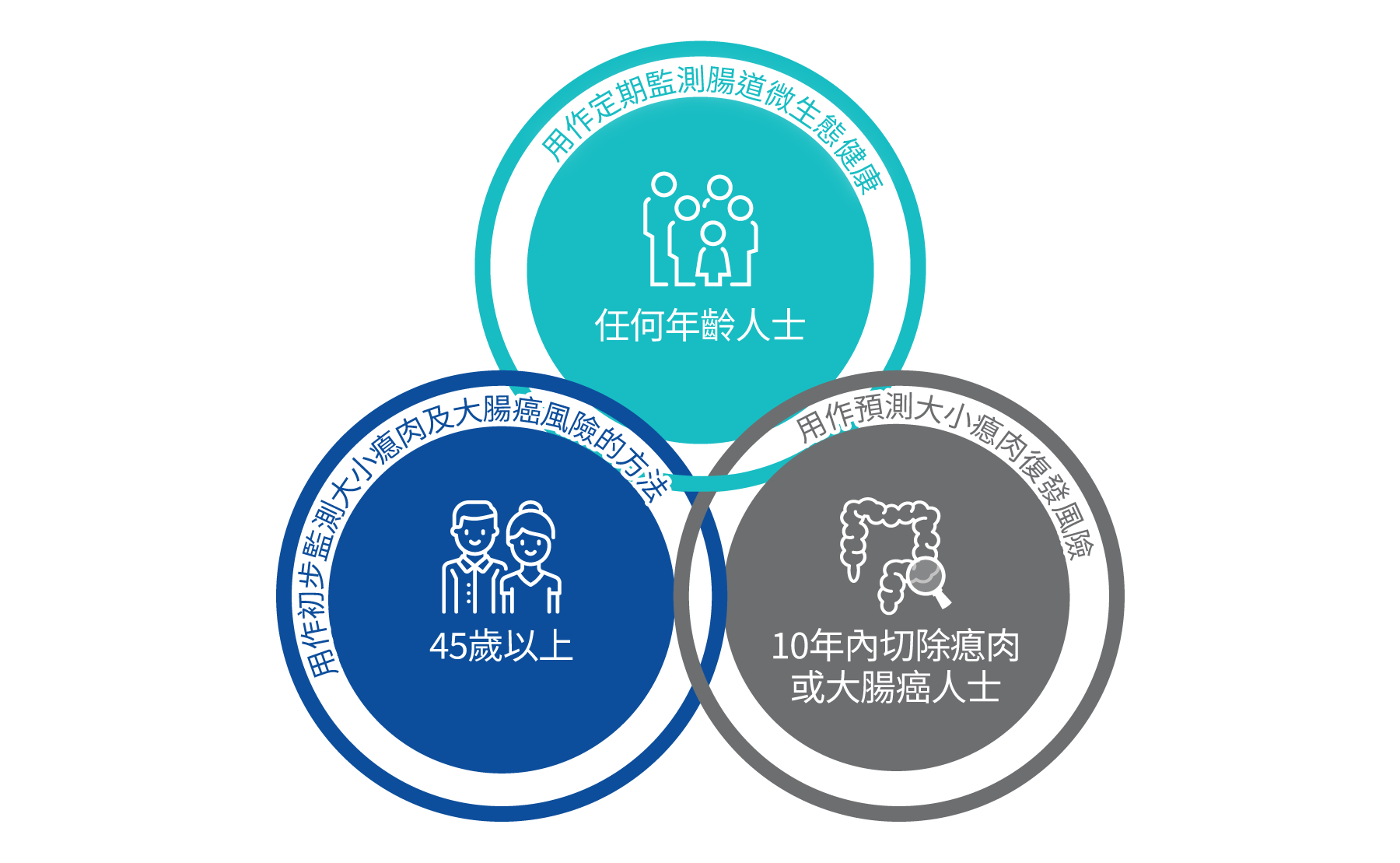Description
"Developed and clinically proven by the Faculty of Medicine of a Renowned University in Hong Kong"
"M3 BACTERIAL GENE MARKERS TEST TECHNOLOGY"
"WORLD'S FIRST NON-INVASIVE Colorectal Cancer Risk Prediction Test that detects non-advanced adenoma and adenoma recurrence with HIGH SENSITIVITY"
Colorectal cancer (CRC) has been the commonest and second deadliest cancer in Hong Kong since 2013. Most CRCs develop from small polyps (see figure) that are treatable but often undetected. Various non-invasive tests for CRC are currently available in the market, but they fail to address the need in detecting small polyps for preventative care. FIT (fecal immunochemical test), the most common of these tests, has a sensitivity of just 7.6% for small polyps. The stool DNA test, one of the newest CRC screening tests, similarly only has a sensitivity of 17.2% for small polyps. (Imperiale, NEJM, 2014)
How does small polyp progress to colorectal cancer?

*Small polyp refers to non-advanced adenoma, large polyp refers to advanced-adenoma
Removed adenoma has a 50% chance of recurrance#1

#1. ME Martinez, R Sampliner, JR Marshall, et al. Adenoma characteristics as risk factors for recurrence of advanced adenomas. Gastroenterology 2001;120:1077-83.

Early detection and removal of precancerous polyps (adenomas) can prevent CRC and reduce mortality5

The microbiome is closely related to CRC. Intestines that are persistently exposed to a hostile microbial environment have higher risks for CRC. Scientists from the Faculty of Medicine of A Renowned University in Hong Kong are among the first in the world to identify a series of bad bacteria that are specific to CRC populations. By measuring the levels of these bacteria, we detect CRC and colorectal polyps, including small polyps, and recurrent adenoma, at extremely high sensitivity. Through this measurement, we can also compute your gut microbial health, informing dietary adjustments and microbiota modulation to reduce the risk for having CRC.
Gut Microbiome is Linked to the Development of Colorectal Cancer
We cannot edit our human genome, but we can modulate our gut microbiome to improve health
The gut microbiome dictates human health. In fact, 90% of cell counts in a human body belong to microbes, most of which reside in the intestine and interact with human cells. Studies found that:

Only 12-35% of CRC can be explained by hereditary factor6

The gut microbiome of CRC patients is different from that of healthy individuals7

Gut microbiome dysbiosis may promote cancer formation in the colon8
The Features of G-NiiB M3CRC
WORLD’S FIRST NON-INVASIVE Colorectal Cancer Risk Prediction Test that detects non-advanced adenoma

Detects colorectal cancer, non-advanced adenoma and recurrent adenoma through testing bacteria from stool

Non-invasive and painless stool collection

94% sensitivity for CRC is as robust as colonoscopy1

Sensitivity for adenoma is superior to currently available non-invasive tests

Dietary recommendations included
How does G-NiiB M3CRC predict the risk of colorectal cancer, adenoma and adenoma recurrence?

G-NiiB M3CRC measures the levels of M3 bad bacteria (patented discovery by the Faculty of Medicine of A Renowned University in Hong Kong) plus hemoglobin in the stool. Using our propriety algorithm, we generate 3 risk indices corresponding to risks of colorectal cancer, adenoma and adenoma recurrence. Higher risk indices reflect higher risks of having colorectal cancer, adenoma and adenoma recurrence.

The Test Journey


The Advantages of G-NiiB M3CRC
G-NiiB M3CRC is the World’s FIRST NON-INVASIVE Colorectal Cancer Risk Prediction Test that detects non-advanced adenoma and adenoma recurrence with High Sensitivity. The sensitivity of CRC detection is 94%, which is comparable to colonoscopy1 and the specificity is 85%. The sensitivity of adenoma detection is superior to the currently available non-invasive tests (especially for small polyps)1
Adenoma Recurrence
Can up to 90%3
*at 85% specificity
CRC: colorectal cancer
AA: advanced adenoma
nAA: non-advanced adenoma

Applicable Users
A novel tool for monitoring gut microbial health
A persistently high score indicates a hostile microbial environment that is favorable for the development of CRC.

Flexible stool collection at home
To ensure the accuracy of the testing, please read the following notes carefully:
- Maintain regular diet within 2 weeks
- Avoid antibiotics within 4 weeks
- Avoid probiotics within 4 weeks
- Do not collect the stool sample when it is watery due to diarrhoea and when there is bleeding from haemorrhoids and menstruation
- Follow this Guide to collect the sample carefully. Return the sample within 24 hours
Reference
1. The Chinese University of Hong Kong. CUHK develops a novel faecal test that can detect polyps and early colon cancers with sensitivity over 90% [Press Release]. 2021.
2. Liang JQ, Li T, Nakatsu G, et al. A novel faecal Lachnoclostridium marker for the non-invasive diagnosis of colorectal adenoma and cancer. Gut. 2020;69(7):1248-1257.
3. Liang JQ, Zeng Y, Kwok G, et al. Novel microbiome signatures for non-invasive diagnosis of adenoma recurrence after colonoscopic polypectomy. Aliment Pharmacol Ther. 2022;55(7):847-855.
4. Martínez ME, Sampliner R, Marshall JR, Bhattacharyya AK, Reid ME, Alberts DS. Adenoma characteristics as risk factors for recurrence of advanced adenomas. Gastroenterology. 2001;120(5):1077-1083. doi:10.1053/gast.2001.23247.
5. JJ Sung, SC Ng, FK Chan, HM Chiu, HS Kim, T Matsuda, SS Ng, JY Lau, S Zheng, S Adler, N Reddy, KG Yeoh, KK Tsoi, JY Ching, EJ Kuipers, L Rabeneck, GP Young, RJ Steele, D Lieberman, KL Goh, and G Asia Pacific Working, An updated Asia Pacific Consensus Recommendations on colorectal cancer screening. Gut, 2015. 64(1): p. 121-32.
6. SH Wong and J Yu, Gut microbiota in colorectal cancer: mechanisms of action and clinical applications. Nat Rev Gastroenterol Hepatol, 2019. 16(11): p. 690-704.
7. J Yu, Q Feng, SH Wong, D Zhang, QY Liang, Y Qin, L Tang, H Zhao, J Stenvang, Y Li, X Wang, X Xu, N Chen, WK Wu, J Al-Aama, HJ Nielsen, P Kiilerich, BA Jensen, TO Yau, Z Lan, H Jia, J Li, L Xiao, TY Lam, SC Ng, AS Cheng, VW Wong, FK Chan, X Xu, H Yang, L Madsen, C Datz, H Tilg, J Wang, N Brunner, K Kristiansen, M Arumugam, JJ Sung, andJ Wang, Metagenomic analysis of faecal microbiome as a tool towards targeted noninvasive biomarkers for colorectal cancer. Gut, 2017. 66(1): p. 70-78.
8. SH Wong, L Zhao, X Zhang, G Nakatsu, J Han, W Xu, X Xiao, TNY Kwong, H Tsoi, WKK Wu, B Zeng, FKL Chan, JJY Sung, H Wei, and J Yu, Gavage of Fecal Samples From Patients With Colorectal Cancer Promotes Intestinal Carcinogenesis in Germ-Free and Conventional Mice. Gastroenterology, 2017. 153(6): p. 1621-1633 e6.
